Job Feedback Letter
Dear [Recipient's Name],
I hope this letter finds you well. I am writing to provide feedback on my experience working at [Company/Organization Name]. I want to express my gratitude for the opportunity to be a part of your team and share my thoughts on the overall job experience.
First and foremost, I would like to convey my appreciation for the supportive and inclusive work environment that was fostered at [Company/Organization Name]. Throughout my tenure, I consistently felt encouraged to contribute ideas, collaborate with colleagues, and grow both personally and professionally. The team's willingness to embrace diversity and respect different perspectives greatly enhanced my job satisfaction.
I would also like to commend the management team for their strong leadership skills and their commitment to open communication. The regular team meetings, one-on-one sessions, and constructive feedback sessions helped me gain clarity on my role, set achievable goals, and monitor my progress. This approach created a positive work atmosphere where I felt valued and motivated to excel.
Furthermore, the professional development opportunities provided by [Company/Organization Name] were exceptional. From training programs to workshops and conferences, I was given ample chances to enhance my skill set, stay up-to-date with industry trends, and broaden my knowledge. The organization's investment in employee growth demonstrated a genuine commitment to fostering a talented workforce.
In terms of the work itself, I found my role challenging and intellectually stimulating. The projects I was assigned allowed me to leverage my skills and contribute meaningfully to the team's objectives. The collaborative nature of the work environment fostered a sense of teamwork, and I appreciated the opportunity to work with individuals who were passionate and dedicated to achieving shared goals.
While my overall experience at [Company/Organization Name] has been overwhelmingly positive, I would like to offer a suggestion for improvement. I believe that streamlining certain administrative processes and adopting more efficient communication tools would enhance productivity and facilitate seamless collaboration across departments.
Once again, I would like to express my deepest gratitude for the valuable experience and professional growth I gained during my time at [Company/Organization Name]. I am genuinely proud to have been associated with such an exceptional organization and the remarkable team of individuals that make it thrive.
Please feel free to reach out if there is anything else I can provide or if you would like further feedback. I wish you and the entire team continued success in all future endeavors.
Thank you for your attention and support.
Sincerely,
[Your Name]
Positive Feedback After Successful Project Completion
Subject: Outstanding Work on [Project Name]
Dear [Employee Name],
I wanted to take a moment to express my sincere appreciation for your exceptional work on the [Project Name] project. Your dedication, creativity, and attention to detail significantly contributed to its success.
Your ability to [specific achievement] demonstrated not only your technical skills but also your commitment to excellence. The way you handled [specific challenge] was particularly impressive and showed great problem-solving abilities.
The positive feedback we've received from [clients/stakeholders/team members] is a direct reflection of your hard work. Your contributions have set a high standard for future projects.
Thank you for your outstanding effort. I look forward to seeing your continued growth and success.
Best regards,
[Your Name]
[Your Title]
Constructive Feedback for Performance Improvement
Subject: Performance Feedback and Development Discussion
Dear [Employee Name],
I wanted to schedule time to discuss your recent performance on [project/task/responsibility]. While I appreciate your effort and commitment, I've noticed some areas where we can work together to enhance your effectiveness.
Specifically, I've observed that [describe specific behavior or outcome] has impacted [explain the impact]. For example, [provide concrete example]. This is an area where I believe you have the potential to improve significantly.
I'd like to work with you to develop a plan that includes [specific suggestions for improvement]. I'm confident that with focused effort and the right support, you can excel in this area.
Please let me know your availability this week so we can discuss this further and create an action plan together. I'm here to support your professional development.
Sincerely,
[Your Name]
[Your Title]
Feedback Request Email to Manager After Completing Assignment
Subject: Request for Feedback on [Assignment/Project Name]
Hi [Manager Name],
I hope this message finds you well. I recently completed [assignment/project name] and wanted to reach out to request your feedback on my work.
I would greatly appreciate your thoughts on what went well and any areas where I could improve. Specifically, I'm interested in your perspective on [mention specific aspects: approach, quality, timeliness, communication, etc.].
Your feedback is valuable to me as I continue to develop my skills and contribute more effectively to the team. If you have time for a brief meeting or can share your thoughts via email, I would be grateful.
Thank you for taking the time to review my work.
Best regards,
[Your Name]
Peer-to-Peer Feedback Letter (Informal)
Subject: Quick Feedback on Our Recent Collaboration
Hey [Colleague Name],
I wanted to reach out and share some thoughts about our collaboration on [project/task]. Working with you has been a great experience!
I really appreciated how you [specific positive behavior], which made our workflow so much smoother. Your expertise in [area] definitely elevated the final outcome.
One small suggestion for next time—it might help if we [constructive suggestion]. I think it could make our process even more efficient.
Overall, it's been fantastic working together, and I'm looking forward to our next project!
Cheers,
[Your Name]
Formal Performance Review Feedback Letter
Subject: Annual Performance Review Summary
Dear [Employee Name],
This letter serves as a formal summary of your annual performance review conducted on [date]. During this review period, we discussed your accomplishments, challenges, and goals for the coming year.
Key Strengths:
Your performance in [areas] has been exemplary. You consistently demonstrated [qualities] and achieved [specific results]. Your contributions to [projects/initiatives] were particularly noteworthy.
Areas for Development:
We identified opportunities for growth in [areas]. To support your development, we agreed upon the following action items: [list specific goals or training].
Performance Rating: [Rating]
Goals for Next Review Period:
[List 3-5 specific, measurable goals]
We will schedule quarterly check-ins to monitor your progress and provide ongoing support. Please sign and return this letter to acknowledge receipt.
I appreciate your contributions to our team and organization.
Sincerely,
[Manager Name]
[Title]
Feedback Letter for Remote Team Member
Subject: Feedback on Your Remote Work Performance
Dear [Employee Name],
As we continue to work in a remote environment, I wanted to provide you with feedback on how you're managing your responsibilities and contributing to our team from afar.
Your communication skills have been excellent. I appreciate how you consistently update the team on your progress and proactively reach out when you need clarification. Your participation in virtual meetings is engaged and valuable.
One area I'd like you to focus on is [specific area]. While working remotely presents unique challenges, I believe with [specific suggestion], you can enhance your effectiveness in this area.
Your flexibility and adaptability during this transition have been commendable. Let's schedule a video call next week to discuss any support you might need and to set goals for the upcoming quarter.
Thank you for your continued dedication.
Best regards,
[Manager Name]
Encouraging Feedback for Struggling Employee (Heartfelt)
Subject: Support and Encouragement
Dear [Employee Name],
I wanted to reach out because I've noticed you've been facing some challenges lately with [specific area/project]. I want you to know that I recognize your effort and I'm here to support you.
Everyone goes through difficult periods, and I've seen your potential and the value you bring to our team. Your strengths in [list specific strengths] are genuine assets that we appreciate.
I believe that with some adjustments and additional support, you can overcome these current obstacles. Let's work together to identify what resources, training, or changes might help you succeed. This might include [suggestions: mentorship, reduced workload temporarily, training, etc.].
Please know that my door is always open, and I'm invested in your success. You're a valued member of our team, and I'm confident we can work through this together.
Let's meet soon to discuss how I can best support you.
With encouragement,
[Manager Name]
Exit Interview Feedback Letter
Subject: Exit Interview Summary and Farewell
Dear [Employee Name],
Thank you for taking the time to participate in your exit interview on [date]. Your candid feedback about your experience with our organization is invaluable as we strive to improve our workplace culture and operations.
During our conversation, you shared insights about [summarize key points: reasons for leaving, positive experiences, areas for improvement]. We take this feedback seriously and will use it to make meaningful changes where appropriate.
Your contributions during your tenure, particularly [specific achievements], have made a lasting impact on our team and organization. We're grateful for your [length of service] of dedicated service.
We wish you every success in your future endeavors. Should you need a reference or wish to return in the future, please don't hesitate to reach out.
Thank you again for your contributions and honest feedback.
Best wishes,
[Manager Name]
[Title]
What is a Job Feedback Letter and Why is it Important
A job feedback letter is a formal or informal communication that provides an employee with insights about their work performance, behavior, skills, or contributions. The primary purposes include:
- Performance evaluation: Documenting accomplishments and areas needing improvement
- Professional development: Guiding career growth through constructive criticism
- Recognition: Acknowledging excellent work and motivating continued success
- Documentation: Creating a paper trail for HR records and future reference
- Communication: Maintaining transparency between managers and employees
- Relationship building: Strengthening trust through honest, respectful dialogue
- Goal alignment: Ensuring employee efforts align with organizational objectives
When Should You Send a Job Feedback Letter
Job feedback letters are appropriate in numerous situations:
- After project completion: When an employee finishes a significant assignment
- During performance reviews: Quarterly, bi-annual, or annual evaluation periods
- Following observation of exceptional work: To recognize outstanding performance immediately
- When problems arise: To address performance issues before they escalate
- Upon promotion or role change: To acknowledge growth and set new expectations
- During probationary periods: To guide new hires through their initial months
- Before termination: To document performance issues as part of disciplinary process
- After training programs: To assess skill application and learning outcomes
- During exit interviews: To gather feedback and maintain positive relationships
- When receiving feedback requests: When employees proactively seek guidance
- After collaborative projects: To strengthen peer relationships and team dynamics
Who Should Write and Send Job Feedback Letters
The sender depends on organizational structure and feedback purpose:
- Direct managers/supervisors: Most common senders for performance feedback
- Senior executives: For recognition of exceptional achievements or major milestones
- HR professionals: For formal reviews, exit interviews, or policy-related feedback
- Project leaders: When providing feedback on specific project contributions
- Peers/colleagues: For collaborative feedback in team environments
- Mentors: When providing developmental guidance
- Department heads: For cross-functional project feedback
- External consultants: In performance improvement scenarios
- Team leads: For day-to-day operational feedback
To Whom Should Job Feedback Letters Be Addressed
Recipients vary based on the feedback context:
- Individual employees: Direct team members receiving performance evaluations
- Remote workers: Team members working from different locations
- New hires: Employees in probationary or onboarding phases
- High performers: Staff members deserving recognition
- Struggling employees: Those requiring performance improvement plans
- Departing employees: Staff members leaving the organization
- Promoted employees: Workers transitioning to new roles
- Project contributors: Anyone involved in specific initiatives
- Cross-functional team members: Employees from different departments
How to Write an Effective Job Feedback Letter
Follow this process for maximum impact:
- Prepare thoroughly: Review performance data, notes, and specific examples before writing
- Choose the right timing: Send feedback while events are fresh but allow time for reflection
- Start with positive observations: Begin by acknowledging strengths and contributions
- Be specific and concrete: Use detailed examples rather than vague generalizations
- Focus on behaviors, not personality: Address actions and outcomes, not character traits
- Balance positive and constructive: Include both praise and areas for improvement
- Provide actionable suggestions: Offer clear guidance on how to improve
- Use appropriate tone: Match formality to situation and relationship
- Invite dialogue: Encourage response and two-way communication
- Proofread carefully: Ensure clarity, professionalism, and accuracy
- Document properly: Keep copies for HR files and future reference
Requirements and Prerequisites Before Sending Feedback
Ensure these elements are in place:
- Observation period: Sufficient time observing the employee's work to provide informed feedback
- Documented evidence: Specific examples, metrics, or incidents to reference
- Clear performance standards: Established expectations and criteria for evaluation
- Objectivity: Unbiased assessment based on facts, not personal feelings
- Privacy considerations: Appropriate setting for delivery of sensitive feedback
- Company policy compliance: Adherence to organizational feedback protocols
- Managerial authority: Proper authorization to provide formal feedback
- Support resources available: Access to training, mentoring, or development programs to offer
- HR consultation: For serious performance issues, consult HR before sending
- Emotional preparedness: Right mindset to deliver feedback constructively
Formatting Guidelines for Job Feedback Letters
Proper formatting enhances effectiveness:
- Length: 250-500 words for routine feedback; longer for formal reviews
- Structure: Clear introduction, body with specific points, concluding summary
- Tone: Professional and respectful; warm for positive feedback, measured for constructive
- Language: Direct and clear; avoid jargon or overly complex vocabulary
- Format: Business letter format for formal feedback; email format for informal
- Timing: Send during business hours; avoid weekends or holidays
- Subject line: Clear and specific (e.g., "Performance Feedback: Q3 Review")
- Signature: Include full name, title, and contact information
- Confidentiality: Mark as confidential when containing sensitive information
- Accessibility: Use plain language and clear formatting for easy comprehension
What to Do After Sending Job Feedback
Follow-up actions ensure feedback effectiveness:
- Schedule follow-up meeting: Discuss feedback in person within 1-2 weeks
- Create action plan: Develop specific goals and timelines collaboratively
- Monitor progress: Check in regularly on improvement areas
- Document the conversation: Note employee responses and agreed-upon actions
- Provide resources: Offer training, mentoring, or tools to support development
- Be available: Make yourself accessible for questions or clarifications
- Track improvements: Measure progress against established benchmarks
- Adjust expectations: Modify goals if circumstances change
- Recognize progress: Acknowledge improvements publicly when appropriate
- File copies: Maintain records for HR and future performance reviews
- Set next review date: Establish timeline for subsequent feedback sessions
Advantages and Disadvantages of Job Feedback Letters
Advantages:
- Creates documented record for legal and HR purposes
- Provides time for thoughtful, measured communication
- Reduces emotional reactivity compared to verbal-only feedback
- Allows employee to process information at their own pace
- Demonstrates organizational commitment to employee development
- Establishes clear expectations and accountability
- Can be referenced later for clarity
Disadvantages:
- May feel impersonal or cold compared to face-to-face conversation
- Risk of misinterpretation without non-verbal cues
- Can create anxiety if tone is unclear
- Time-consuming to craft properly
- May be perceived as overly formal for minor issues
- Lacks immediate two-way dialogue
- Permanent record can feel intimidating to employees
Job Feedback Letters vs. Alternative Approaches
Verbal feedback conversations:
- More personal and immediate but less documented
- Better for minor, day-to-day feedback
- Allows real-time dialogue and clarification
Performance reviews:
- More comprehensive and formal than standalone feedback letters
- Typically tied to compensation decisions
- Occur on fixed schedules rather than as-needed
360-degree feedback:
- Incorporates input from multiple sources (peers, subordinates, managers)
- More holistic but more complex to implement
- Often anonymous, unlike direct feedback letters
Coaching sessions:
- More developmental and forward-focused
- Ongoing relationship rather than one-time communication
- Less formal documentation
Recognition programs:
- Focus exclusively on positive achievements
- Often public rather than private
- May include rewards or incentives
Tips and Best Practices for Job Feedback Letters
- Use the "sandwich method" sparingly: While starting and ending positively is good, don't bury critical feedback
- Be timely: Provide feedback within days or weeks of the observed behavior
- Customize your approach: Tailor tone and detail to individual employee needs
- Focus on growth: Frame feedback as developmental opportunity, not criticism
- Quantify when possible: Use metrics and data to support your observations
- Ask questions: Invite employee perspective and self-assessment
- Avoid comparisons: Don't compare employee to colleagues
- Be consistent: Apply same standards across all team members
- Keep emotions in check: Write objectively, even when frustrated
- Offer solutions: Don't just identify problems; suggest paths forward
- Use "I" statements: "I observed" rather than "You always"
- Proofread multiple times: Errors undermine your credibility
Common Mistakes to Avoid in Job Feedback Letters
- Being too vague: Using general statements like "good job" without specifics
- Delaying feedback: Waiting too long after the observed behavior or event
- Making it personal: Attacking character rather than addressing behaviors
- Overwhelming with criticism: Listing too many issues at once
- Lacking examples: Failing to provide concrete instances to support claims
- Using aggressive language: Employing harsh or accusatory tone
- Ignoring context: Not considering external factors affecting performance
- Forgetting the positive: Only focusing on negatives in constructive feedback
- Being overly casual: Using inappropriate informality in serious situations
- Surprising the employee: Providing formal written feedback without prior discussion
- Copying too many people: Including unnecessary recipients on sensitive feedback
- Making promises you can't keep: Offering rewards or opportunities without authority
- Writing when emotional: Sending feedback while angry or frustrated
Essential Elements and Structure of Job Feedback Letters
Every effective job feedback letter should include:
- Clear subject line: Indicates purpose immediately (e.g., "Q4 Performance Feedback")
- Professional greeting: Appropriate salutation for the relationship and context
- Opening statement: Brief introduction explaining the letter's purpose
- Specific observations: Detailed examples of behaviors or outcomes being addressed
- Impact explanation: How the employee's actions affected the team, project, or organization
- Balanced perspective: Both strengths and areas for improvement when applicable
- Actionable recommendations: Clear guidance on next steps or improvements
- Support offer: Statement of availability to help and resources available
- Future expectations: What success looks like going forward
- Closing summary: Recap of key points and expression of confidence
- Professional sign-off: Appropriate closing and signature
- Contact information: How the employee can reach you for follow-up
- Attachments (when relevant): Performance data, improvement plans, or related documents
Frequently Asked Questions About Job Feedback Letters
Should feedback letters always be formal? No. Formality depends on context. Routine feedback can be casual; serious performance issues require formality.
How often should employees receive feedback letters? Beyond annual reviews, provide written feedback after major projects, during check-ins, or when significant issues arise.
Can I send negative feedback via email? For minor issues, yes. For serious problems, schedule a meeting first, then follow up with written documentation.
What if the employee disagrees with my feedback? Invite their perspective, listen openly, and be willing to adjust if they provide valid counterpoints.
Should I copy HR on feedback letters? For routine feedback, usually not. For formal reviews or performance improvement plans, yes.
How detailed should feedback be? Detailed enough to be clear and actionable, but concise enough to be digestible (typically 250-500 words).
Is it okay to give feedback to peers? Yes, when organizational culture supports peer feedback and it's done respectfully and constructively.
Should I ask employees to sign feedback letters? For formal performance reviews or disciplinary actions, yes. For routine feedback, typically not necessary.

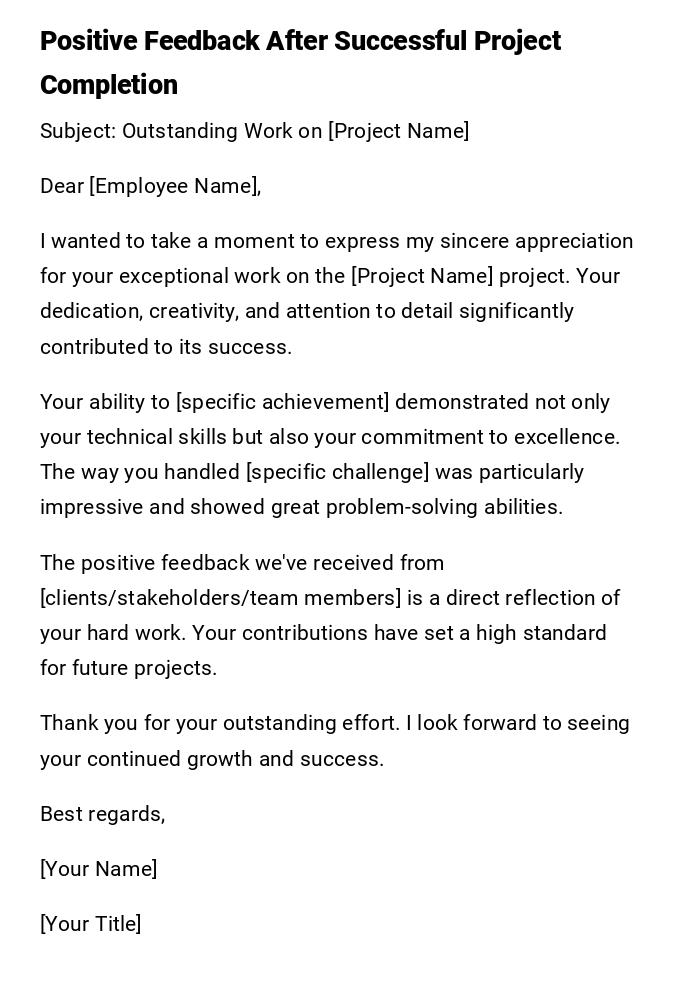
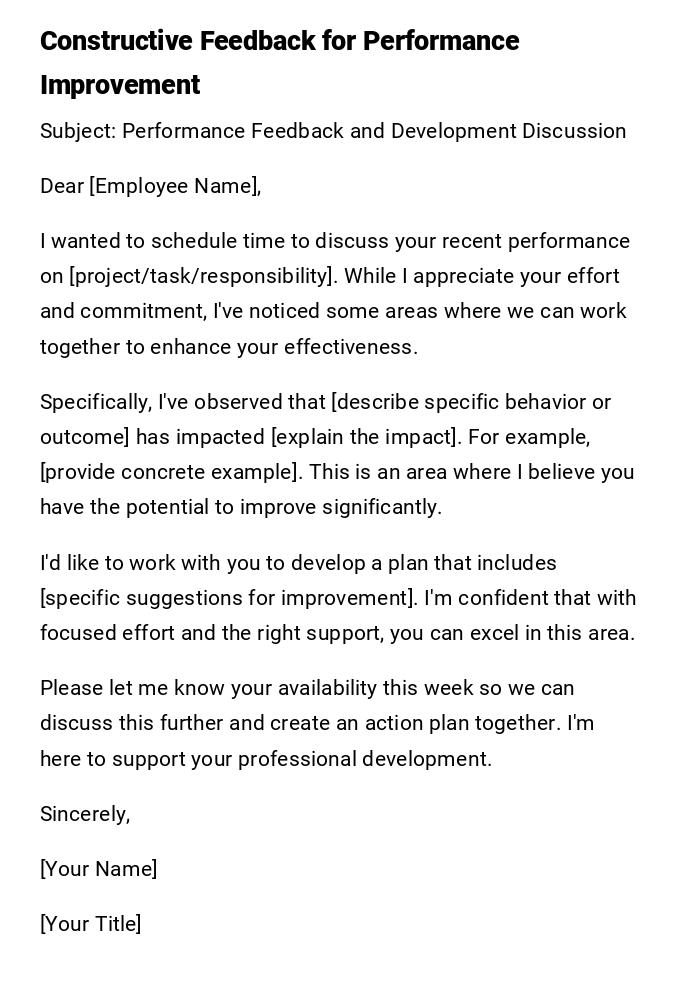
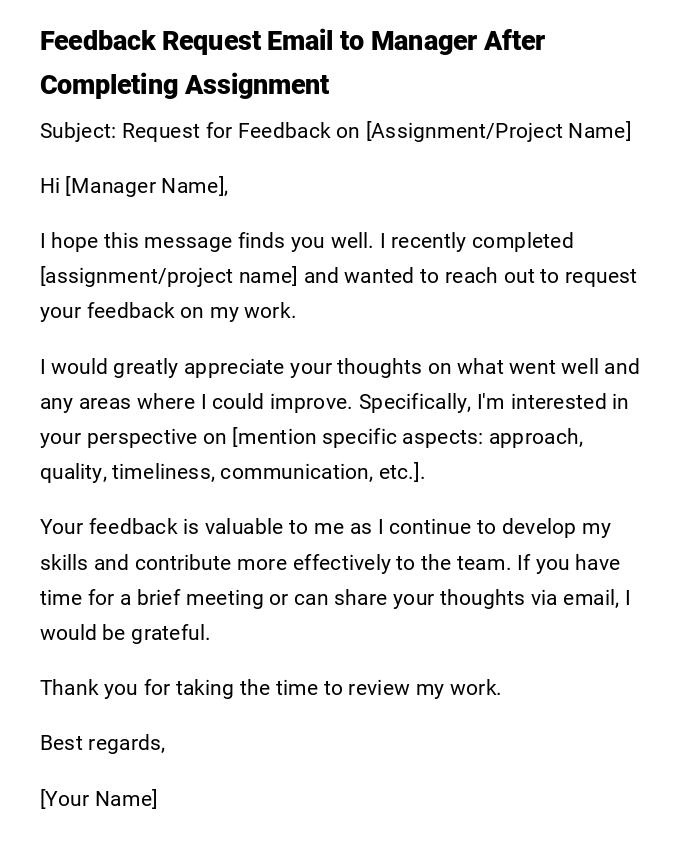
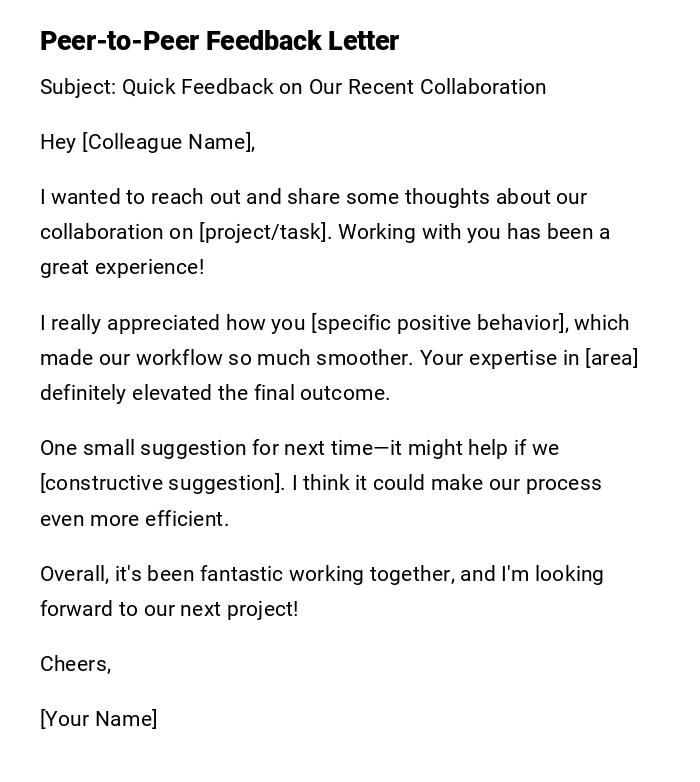
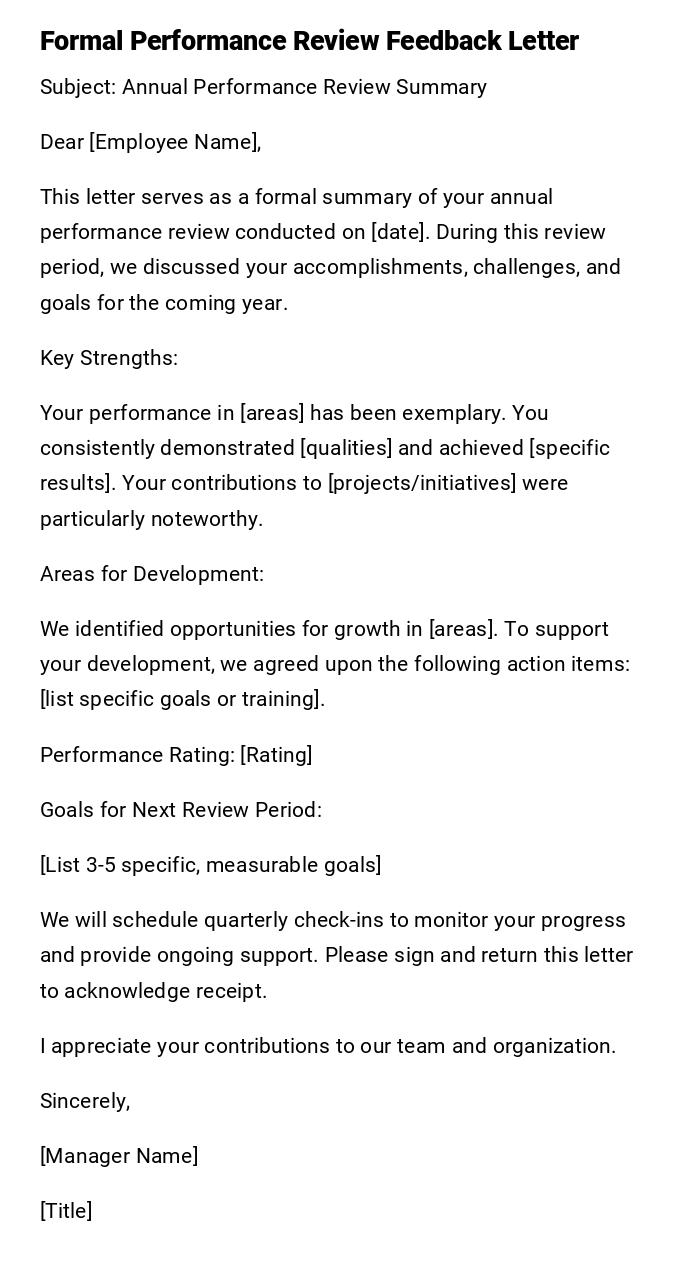
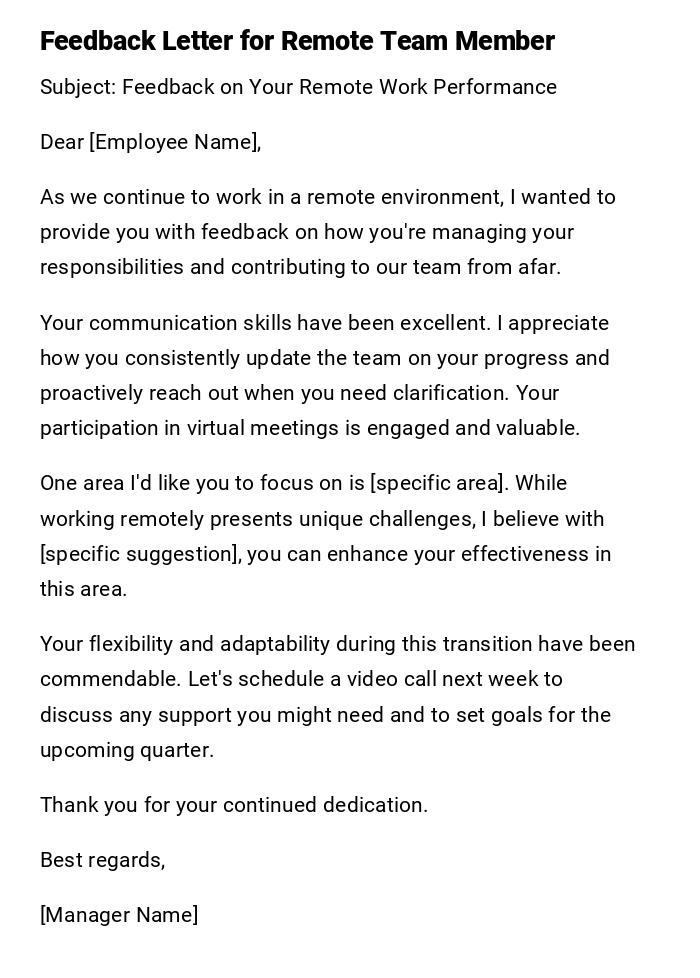
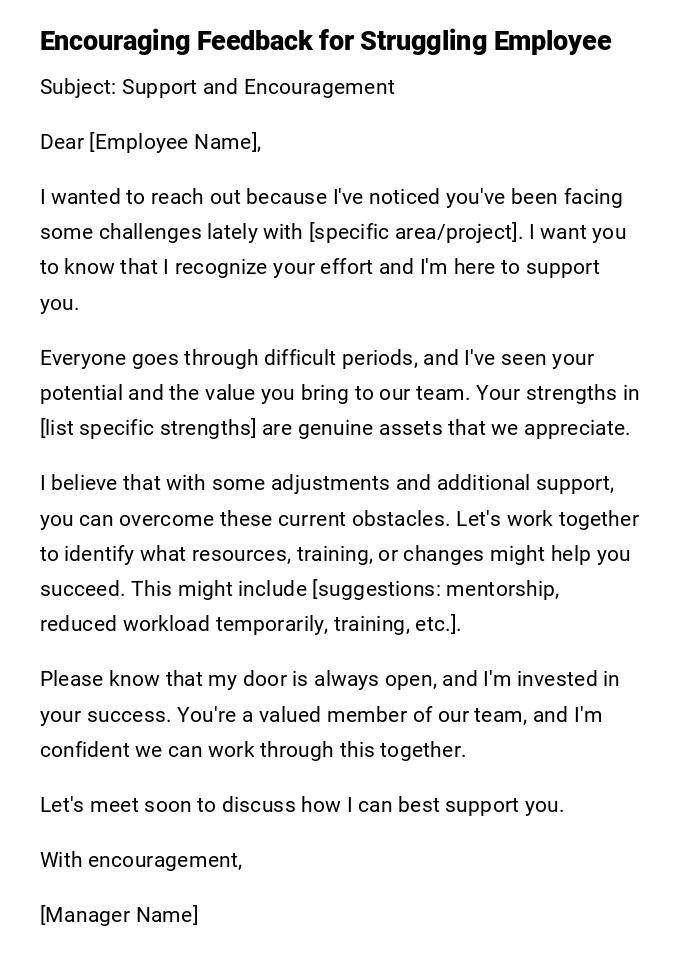
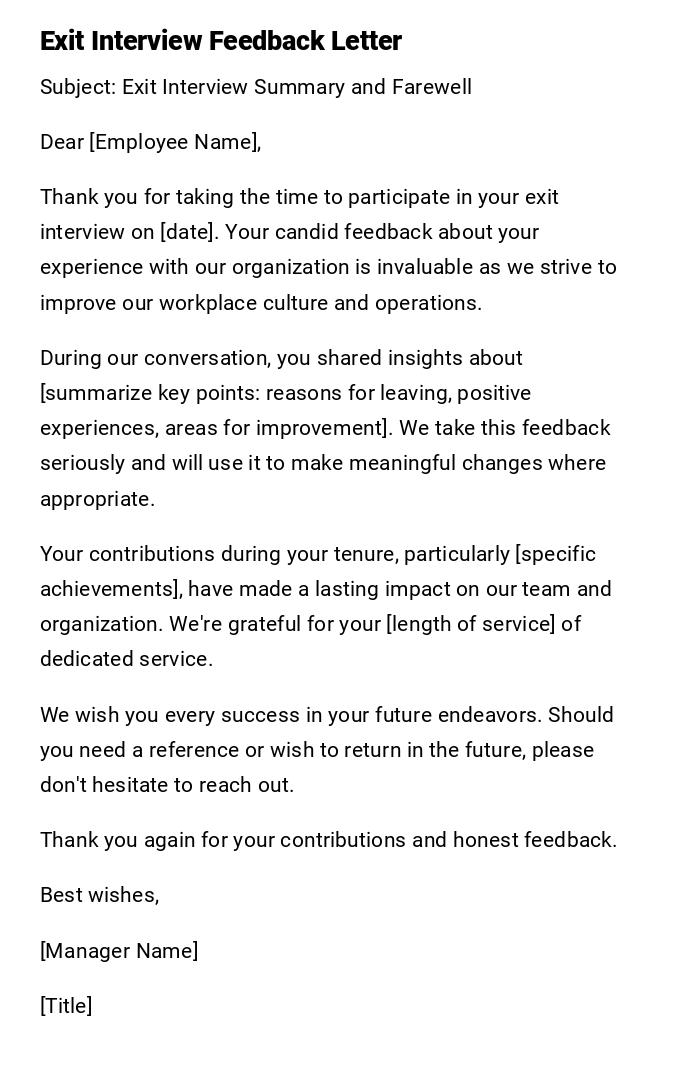

 Download Word Doc
Download Word Doc
 Download PDF
Download PDF